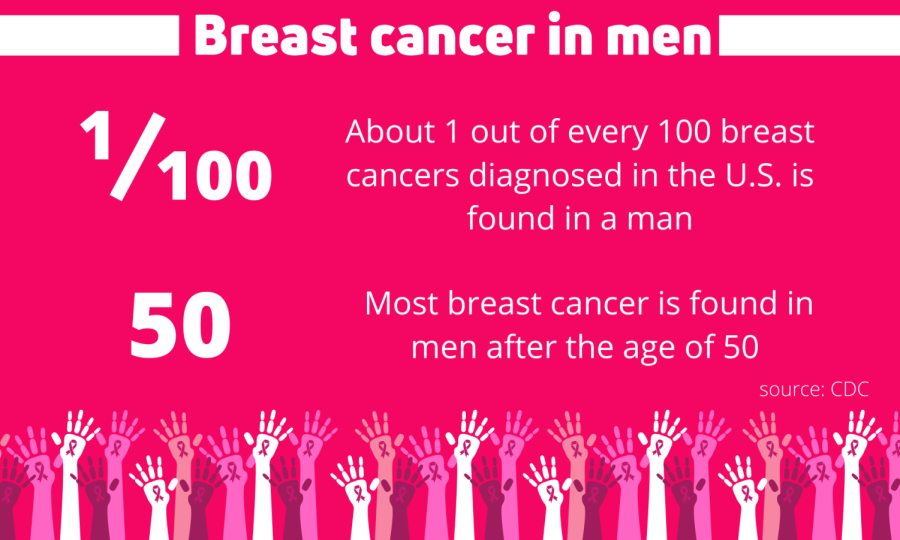Breast cancer can appear in women, men
October 11, 2021
An estimated 284,000 people in the U.S. will be diagnosed with breast cancer in 2021, according to Cancer.Net.
Breast cancer most commonly affects women. However, men can also develop breast cancer.
According to the CDC, about 1 out of every 100 breast cancer cases diagnosed in the U.S. is found in a man.
October is Breast Cancer Awareness Month, which is a time dedicated to spreading awareness about breast cancer in women and men while remembering those who have lost their lives.
However, men are often left out of the narrative because breast cancer in men is rare, according to Johns Hopkins University.
Paul Sylvester, a pharmacy professor, researches breast cancer and explained that breast cancer in men is important to look at because it can be deadly. However, it’s not as common in men as in women, so it can often be overlooked.
“It can be very aggressive and can be very deadly, so it is a serious issue […] but it’s actually quite rare,” Sylvester said.
Sylvester believes that men are somewhat protected from breast cancer because of their testosterone while estrogen can stimulate breast cancer in women.
“What happens is the estrogen will stimulate the mammary gland to grow if it’s normal. It also stimulates the breast cells if they’re tumor cells,” Sylvester said. “Testosterone has a way of antagonizing the effects of estrogen, so if estrogen stimulates breast cancer, […] testosterone kind of blocks that effect and has a protective effect to some extent.”
Even though men and women might develop breast cancer differently, breast cancer in men is often found the same way as in women.
According to the CDC, many men find out they have breast cancer because they feel or see a change in their breast. These changes can include lumps, swelling of the breast, redness, flaky skin, nipple discharge and dimpling of the breast skin.
According to Breastercancer.org, women should frequently perform breast self-exams and see a doctor immediately if they notice any changes. However, since breast cancer is rarer in men, they should only do a self-exam if they notice a change and they should also see a doctor immediately after noticing the changes.
Many men don’t know the signs of breast cancer, so continuing to spread awareness is important, according to Siva Murru.
Murru, an assistant professor of organic chemistry, said promoting cancer awareness can help people now and in the future because it could potentially save someone’s life.
“It is important to promote the awareness of cancers, particularly breast cancer, by spreading the information on yearly screenings such as mammograms for early detection, by raising awareness about the risk factors that possibly lead to cancers and of course sharing the survivor’s stories would help inspiring other patients,” Murru said.
Delta Sigma Theta hosted their “Big or Small Save Them All” event last week that informed students that breast cancer can happen in both men and women and taught them the of early signs of it and how to perform self-tests.
Destiny Gilmore, the president of Delta Sigma Theta, said she knows multiple people battling breast cancer, but because they knew the early signs, they detected it quickly and are now living healthy lives.
“Events like these help students to realize that it can happen to anyone, and not just males or females in older age,” Gilmore said. “Sometimes we take our physical health for granted because we are so consumed with work and school, however a brief self-test exam at home can save your life.”



